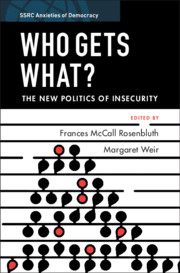Book contents
- Who Gets What?
- SSRC Anxieties of Democracy
- Sponsored by the Social Science Research Council
- Who Gets What?
- Copyright page
- Contents
- Figures
- Tables
- Author Biographies
- Acknowledgments
- 1 Introduction
- Part I People
- 2 Race, Remembrance, and Precarity
- 3 The End of Human Capital Solidarity?
- 4 Public Opinion and Reactions to Increasing Income Inequality
- 5 Engendering Democracy in an Age of Anxiety
- Part II Places
- Part III Politics
- Index
- References
4 - Public Opinion and Reactions to Increasing Income Inequality
from Part I - People
Published online by Cambridge University Press: 20 August 2021
- Who Gets What?
- SSRC Anxieties of Democracy
- Sponsored by the Social Science Research Council
- Who Gets What?
- Copyright page
- Contents
- Figures
- Tables
- Author Biographies
- Acknowledgments
- 1 Introduction
- Part I People
- 2 Race, Remembrance, and Precarity
- 3 The End of Human Capital Solidarity?
- 4 Public Opinion and Reactions to Increasing Income Inequality
- 5 Engendering Democracy in an Age of Anxiety
- Part II Places
- Part III Politics
- Index
- References
Summary
This chapter asks why support for redistribution has not intensified as income inequality in the United States has grown. I review recent literature on this question, including empirical evidence from within as well as beyond the United States, and focusing primarily on research that asks how correct information about inequality affects support for redistribution. First, I consider whether a lack of correct information about inequality is to blame. While citizens commonly underestimate both wealth and income inequality, recent evidence suggests that eliminating such underestimation (by providing citizens with correct information) may not significantly change attitudes toward redistribution. Recent experiments that inform participants about the true extent of inequality have produced inconsistent results with several null findings. Reviewing these findings, I suggest that if information effects exist, they are likely to be conditional on context. Variables that may make information about inequality more consequential for normative attitudes include (a) whether information about the respondent’s own position in the income distribution is included, (b) whether economic mobility is implicated, and (c) whether inequality is seen as changeable. Research is ongoing in each of these areas. More broadly, it seems clear that ideas surrounding the fairness of inequality and the deservingness of social groups are important determinants of support for redistribution, and that these ideas probably matter more than facts about income inequality. The chapter concludes by considering whether Americans are exceptional in how they react to income inequality. While Americans exhibit relatively high confidence in meritocracy, I argue that the dynamics through which we should understand support for redistribution are fundamentally the same in the United States as they are in other industrialized countries.
- Type
- Chapter
- Information
- Who Gets What?The New Politics of Insecurity, pp. 79 - 102Publisher: Cambridge University PressPrint publication year: 2021
References
- 2
- Cited by

